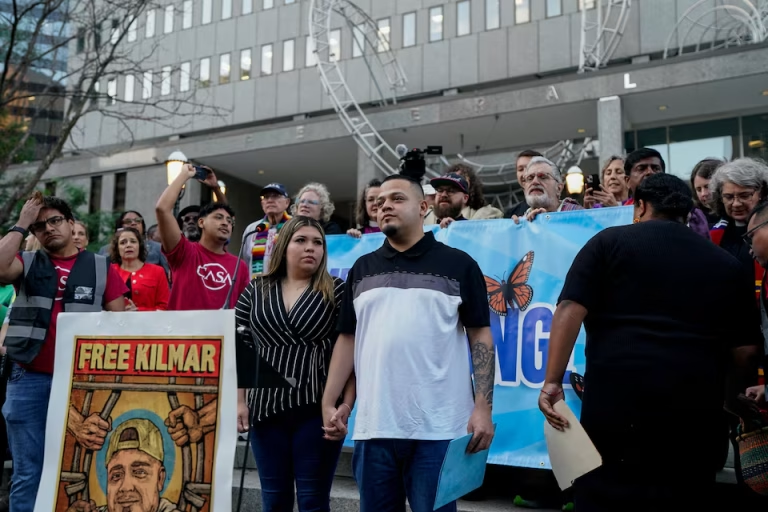Wrongly deported migrant Abrego has been detained again, raising concerns about U.S. immigration practices and potential deportation to Uganda. His legal team asserts that the administration is using a coercive approach to pressure him into pleading guilty to criminal charges for transporting migrants living illegally in the United States.
According to court filings, U.S. officials offered to deport Abrego to Costa Rica—a Spanish-speaking country willing to provide refugee status—if he agreed to a guilty plea. However, if he refuses, the administration plans to deport him to Uganda, a country with unclear legal protections for him.
Plea Negotiations and Legal Challenges
Abrego’s attorney, Simon Sandoval-Moshenberg, stated that Abrego is willing to accept deportation to Costa Rica, provided he is granted refugee status, but has not indicated agreement to plead guilty. His lawyers emphasize that deportation to another country without assurances against return to El Salvador would violate legal protections, as he fears persecution there.
“We don’t know if Uganda will even let him walk around freely in Kampala or whether he’ll be inside of a Ugandan jail cell,” Sandoval-Moshenberg noted.
Abrego’s legal team is exploring plea discussions to potentially prevent his forced removal to Uganda. Legal experts argue that such deportations could be unconstitutional.
Claims of Retaliatory Deportation
Andrea Flores, a former top immigration official under President Biden, called the planned deportation “completely unconstitutional,” describing it as retaliatory for Abrego’s previous fight against removal to El Salvador. Flores stressed that there is no public safety, national security, or legal reason for the deportation to Uganda.
In 2019, a court protected Abrego from deportation to El Salvador due to risks of gang-related persecution. Despite that ruling, federal prosecutors returned him from El Salvador in June to face charges in Nashville, Tennessee.
Family Separation and Detention Conditions
Before his detention, Abrego embraced his wife at an ICE field office, only to be taken into custody shortly after. His family left without him, highlighting the emotional toll of his repeated deportations. He spent over five months in detention, including harsh conditions in a Salvadoran mega-prison known for its strict regime.
Video posted by CASA, an immigrant rights advocacy organization, showed Abrego’s return to his Maryland family home after his release, where he reunited with loved ones and shared a quiet moment, reflecting the human side of these immigration disputes.
Political Commentary and Public Reactions
The case has drawn commentary from political figures. Former officials and immigration advocates criticized the Trump administration for labeling Abrego a “monster” and pushing for his deportation as political posturing. Attorney General Pam Bondi described him as a threat, referencing a protective order filed by his wife in 2021. Meanwhile, former President Trump framed the case as an example of Democrats’ misplaced political calculations, calling Abrego an “animal.”
The public debate underscores the tension between immigration enforcement and human rights protections, with advocates urging fair treatment and adherence to international refugee standards.
Broader Implications for U.S. Immigration Policy
The wrongly deported migrant Abrego case highlights systemic issues in the U.S. immigration system, particularly regarding coercive plea deals and international deportation policies. Legal experts and immigrant rights groups stress the importance of transparent, lawful procedures to prevent individuals from facing life-threatening situations abroad.
This case also draws attention to U.S. obligations under refugee law, particularly regarding protection from countries where individuals may face persecution, torture, or imprisonment without fair trial.
For more context on U.S. immigration laws, see the American Immigration Council and CASA advocacy on migrant rights.
The ongoing detention and possible deportation of wrongly deported migrant Abrego reveal the complexities and human costs of U.S. immigration enforcement. As legal and political battles continue, the case serves as a cautionary example of the importance of upholding due process, refugee protections, and the ethical treatment of migrants in vulnerable situations.

